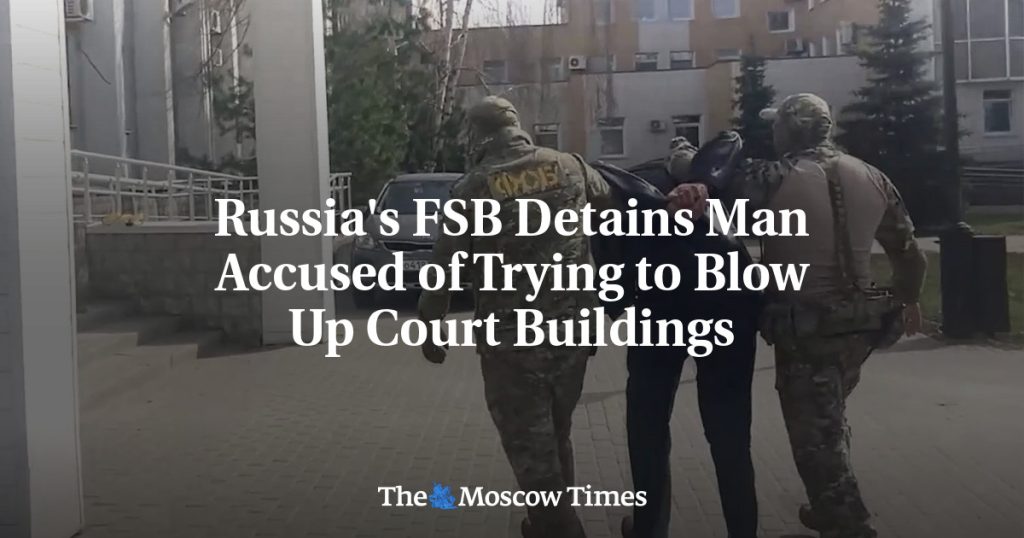A man in his mid-forties has been detained and charged with terrorism in Russia after allegedly attempting to blow up two court buildings on behalf of Ukraine. The Russian Federal Security Service (FSB) stated that the man was caught placing explosive devices near a railway station in the city of Tambov. The FSB reported that the man intended to detonate the homemade explosive devices near the court buildings. He was apprehended by a security guard and taken into custody by the FSB, which stated that he had been recruited by Kyiv’s special services and had regularly visited pro-Ukrainian websites.
The Russian man’s arrest comes in the midst of ongoing tensions between Russia and Ukraine, with Moscow accusing Kyiv of orchestrating numerous attacks on Russian territory since the conflict began over two years ago. The FSB has attributed many of these incidents to Ukraine and its supporters. The FSB reported that the detained man had been gathering information from pro-Ukrainian sources and had been planning the attack with the assistance of Kyiv’s special services earlier in the year. The man’s attempt to carry out the attack near court buildings in Tambov highlights the continued hostility between Russia and Ukraine and the lengths to which individuals are willing to go in support of opposing sides in the conflict.
The incident underscores the ongoing security challenges faced by both Russia and Ukraine as they continue to navigate the complex political and military landscape in the region. The implications of alleged attempts to commit acts of terrorism on behalf of foreign powers highlight the potential for further escalation and violence in an already volatile situation. The arrest of the Russian man accused of attempting to blow up court buildings on behalf of Ukraine serves as a stark reminder of the high stakes involved in the conflict between the two nations and the potential for individuals to engage in acts of violence in support of their respective causes.
The FSB’s assertion that the detained man had been recruited by Kyiv’s special services raises questions about the extent of Ukrainian involvement in alleged acts of terrorism on Russian soil. The accusations from the FSB regarding Ukrainian support for attacks in Russia add another layer of complexity to the conflict between the two nations, further straining already tense relations. The attempted bombing near the court buildings in Tambov serves as a grim reminder of the potential consequences of such actions, highlighting the destructive impact of terrorism on both individuals and society at large.
The detention of the man accused of planning to blow up court buildings on behalf of Ukraine reflects the ongoing intelligence and security efforts of the Russian authorities to combat alleged threats from abroad. The FSB’s swift response to the incident and successful apprehension of the suspect demonstrate the security forces’ vigilance in protecting civilians and preventing acts of terrorism. The arrest serves as a warning to potential perpetrators that such actions will not be tolerated and that those responsible will be held accountable for their actions. The incident also underscores the critical role of effective intelligence gathering and law enforcement in preventing acts of violence and maintaining public safety in a challenging security environment.
Overall, the arrest of the man charged with attempting to blow up court buildings on behalf of Ukraine highlights the complex and multifaceted nature of the ongoing conflict between Russia and Ukraine. The incident serves as a sobering reminder of the potential for violence and instability in the region and the dangerous consequences of escalating tensions between the two nations. The FSB’s actions in thwarting the alleged attack underscore the critical importance of effective security measures and intelligence gathering in preventing acts of terrorism and maintaining stability in the face of ongoing threats. As Russia and Ukraine continue to navigate their tumultuous relationship, incidents such as this serve as a stark reminder of the high stakes involved and the need for diplomatic efforts to de-escalate tensions and promote peaceful resolutions to the conflict.















